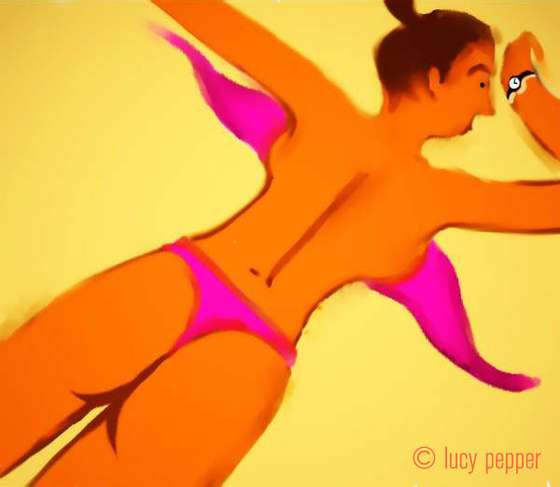É quase Agosto. Está na altura de irmos à praia ou à piscina, se é que já lá não estamos.
Serão horas e horas de descanso, com o som de crianças felizes a bater nas ondas e o pregão do senhor das bolas de Berlim, ou então, na piscina, o chapinhar da água e o musak do hotel a embalar-nos até adormecermos. Ouvimos conversas domésticas, deliciosas ou fatalmente secas, entre maridos e mulheres, ou entre sogras e noras, porque toda a gente se esquece de que um acampamento de toalhas e um chapéu de sol não são uma casa. Vemos casais amorosos e esperamos que não exagerem nos afectos em frente das crianças.
Vamos poder estar deitados durante horas a fio na areia dura ou numa espreguiçadeira dura, até ficamos colados a elas, com as marcas das ripas nas costas. Vamos poder, finalmente, ler os livros que não conseguimos acabar durante o resto do ano, enquanto tentamos encontrar uma posição confortável onde o sol não nos cegue, ou os cotovelos não ardam de estarem espetados na areia. Vamos recordar o ligeiro frisson que é ter, subitamente, o rabo quase nu de outra pessoa na cara, enquanto ela se dobra, sem aviso, para tirar alguma coisa do coldbox. E vamos reencontrar a nossa relação íntima com areia dentro de todas as fendas e rugas do corpo, como parte do ritual mais importante destas estadias na praia: o bronzeamento.
O bronzeado ainda parece ser uma coisa muito importante. Que ninguém se atreva, se vive em Portugal, a não tentar sequer conseguir um bronzeado. Se chegamos ao Outono com pernas brancas, temos de estar preparados para os comentários horrorizados dos nossos amigos.
Conseguir um bom bronzeado não é uma coisa exactamente difícil, mas ainda é vista como uma proeza louvável, quase como perder peso ou ter um novo penteado (algo igualmente tolo). Para granjear esta admiração, temos só de deitar-nos ao sol durante uns dias, até ficarmos estaladiços. Os únicos esforços que temos de fazer é virarmo-nos de vez em quando, como se estivéssemos num espeto, evitar as marcas brancas de alças, e não adormecer entre o meio-dia e as três da tarde, para não acabarmos com um aspecto britânico.
É estranho que o bronzeado se mantenha na moda depois de tudo que já sabemos sobre o cancro e o envelhecimento da pele. É estranho que numa época obcecada pela juventude, as pessoas não lutem com mais esforço para manter a juventude da sua pele. Temos a mania da saúde, da ginástica e das dietas, com que esperamos viver para sempre e sempre saudáveis, mas depois não nos importamos de correr todos os riscos debaixo do sol. E é ainda mais bizarro que cuidemos de todos os órgãos do nosso corpo, menos do nosso órgão maior, só porque as convenções da beleza exigem uma pele bronzeada.
Foi só no século XX que o bronzeado se tornou moda, quando uma vida passada ao ar livre começou a ser bem vista. Antes, uma pessoa ficava em casa ou à sombra para se manter pálida e assim provar que estava acima do saloio que trabalhava no campo. Não foi há muito tempo que os ricos ainda barravam as caras com tinta de chumbo para obter um brilho extra de brancura, que queria dizer “sou melhor do que tu, e estou na moda” (embora com uma vida significativamente mais curta, por causa do chumbo).
Hoje em dia, em vez do chumbo, andamos a secar ao sol até à morte, ao mesmo tempo que tentamos viver para sempre.
(traduzido do original inglês pela autora)
Walking bacon.
August is almost upon us. Time to head for the beach or pool, if we’re not already there.
Hours and hours each day of pure relaxation, with the sounds of happy children and the sea washing in and out, and the bolas de berlim man calling out along the beach, or the lapping of the pool and the hotel musak gently lulling us to sleep. We get to listen in to delicious or deadly domestic conversations held in the open air, between husbands and wives, mothers-in-law and daughters-in-law, because everyone forgets that a sun shade isn’t really a house. We see amorous couples getting carried away and hope they don’t get too carried away in front of our kids.
We can lounge around for hours on the hard sand or a hard sun-lounger until we get stuck to them with ridge marks all over our backs. We can finally read our books that we have struggled to finish during the rest of the year, trying to find a comfortable position where the sun doesn’t blind us, or our elbows don’t burn while they are ground into the sand while supporting our weight. We remember the delight that it is to have other people’s almost bare bums in our faces, given scant warning when that bum is about to bend over to get something from the coldbox. We reacquaint our intimate relationship with sand and all the little crevices that it gets into, and give ourselves a good exfoliating rub down with a mixture of sand and sun tan lotion, as part of the ritual that this whole thing is mostly about. Getting a tan.
The suntan is still a big thing. Woe betide anyone who lives in Portugal not even attempting to get a tan in the summer. If we walk into the autumn with white legs, we must be prepared to hear horrified gasps from our friends.
Getting a good suntan is hardly an achievement, yet still it is regarded with admiration, like losing weight or getting a new haircut (equally silly). To achieve this admiration, all we have to do is lie about for a few days under the sun, getting crispy, the only effort we have to put in (apart from bearing the mind numbing boredom of lying on a beach all day) is remembering to turn ourselves on an imaginary spit, making sure strap marks are kept to a minimum and not falling asleep between about midday and three o’clock so that we don’t end up looking British.
It’s funny that the suntan remains de rigueur after all that has been learned about skin cancer, and skin ageing. It’s odd that people, in this youth obsessed age, aren’t trying to cling on to the youth of their skin as long as humanly possible. It’s even odder that in this equally health and longevity obsessed age in which we obsess about getting fit and eating the right food with the right nutrients and without the wrong chemicals and pesticides, worry about not breathing polluted air, finding spiritual balance and living for as long as possible, we spare all our other organs from abuse. Yet we treat our biggest organ, the skin, the one that holds all the rest in, with disdain because of mere beauty and fashion.
It was only in the 20th Century that getting tanned became fashionable, when outdoorsiness became the thing to be seen doing, as opposed to the previously desirable indoorsiness that proved you were above the level of the outdoor oik who had to till the soil. It’s not so long ago, that the rich were smearing lead paint all over their faces to give that extra white glow of “I’m better than you AND fashionable” (and with a significantly shortened life).
These days, instead of lead paint, we’re cooking ourselves to death while trying to live forever.













